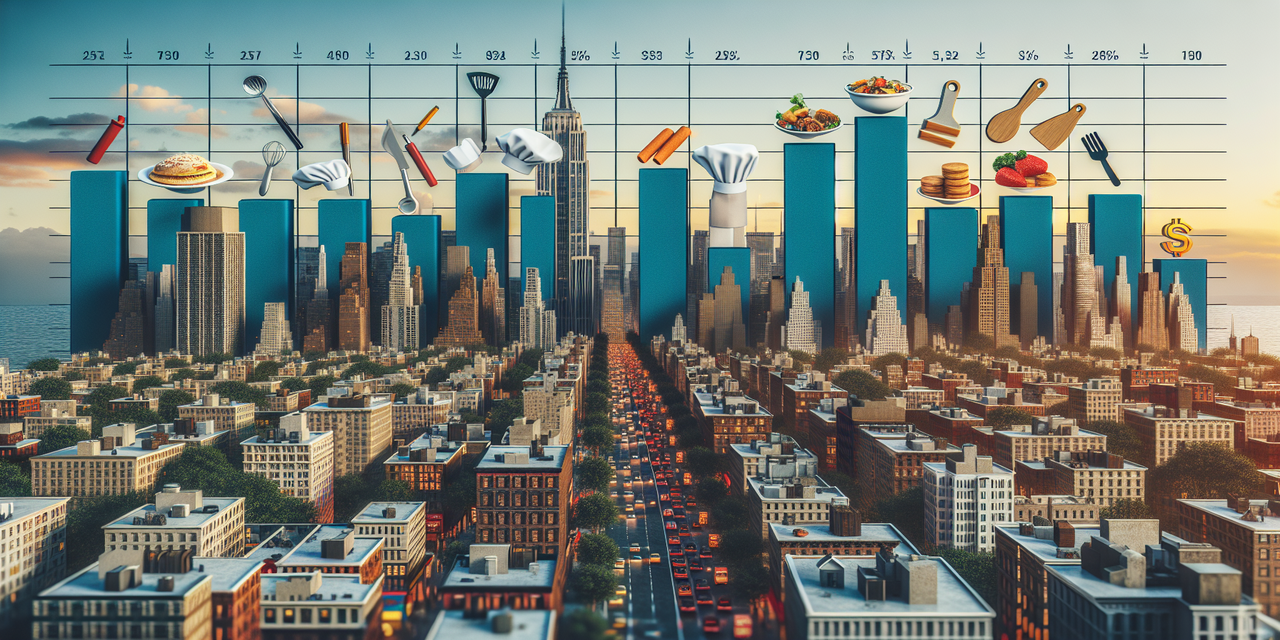New York City Living-Wage Comparison: Key Takeaways
- The average cook in NYC earns about $20.14 per hour, which is higher than the city minimum wage of $16.50.
- The living wage for a single adult in NYC is nearly $37 per hour, almost double the average cook's hourly rate.
- Housing costs, especially rent in Manhattan, are a major factor driving the living wage far above typical cook salaries.
Examining the wages of cooks in New York City against the backdrop of the city’s high cost of living reveals a substantial income gap.
This article explores whether cook salaries can realistically keep pace with living expenses in NYC.
For employers looking for effective hiring strategies, our guide to hiring a cook offers valuable insights to improve recruitment efforts.
1. Overview of Cook Salaries in New York City
As of August 2025, cooks in New York City earn an average of $20.14 per hour. This translates to roughly $41,891 annually assuming full-time employment.
Compared to the city’s minimum wage of $16.50 per hour effective in 2025, cooks make a significantly higher wage.
However, despite exceeding minimum wage standards, this salary is only part of the story when it comes to achieving financial stability in NYC.
Those interested in advancing their career can learn how to become a cook and explore opportunities that may offer better compensation or growth potential.
2. What Is the Living Wage in New York City?
The living wage represents the income necessary to cover basic needs like housing, food, healthcare, and transportation without financial hardship.
According to the Economic Policy Institute, a single adult in New York City needs an annual income of $76,934, or $36.99 per hour, to maintain a basic standard of living.
This living wage is nearly double the average cook’s hourly earnings, signaling a stark gap between income and essential expenses.
Living Wage for People with Dependents
The financial burden increases significantly for workers who support dependents.
A single parent with one child needs an estimated $114,350 annually, which equates to an hourly wage of $54.98 to meet basic living requirements.
This figure is approximately $72,459 higher than the average annual cook salary, emphasizing how challenging it is to support a family on cook wages in NYC.
3. The Impact of Housing Costs on Living Wages
Housing is the largest factor inflating the living wage in New York City.
The median rent for a one-bedroom apartment in Manhattan is $4,443 per month, translating to over $53,000 yearly.
This single expense alone surpasses the entire average annual income of a cook, demonstrating why many find it difficult to afford living in the city.
High rent costs leave cooks with very limited income to allocate towards food, healthcare, transportation, and other essentials.
Restaurant owners looking to manage payroll effectively might benefit from advice in our cost of hiring employees and strategies feature.
4. Why Cook Salaries Fall Short of Living Wages
The discrepancy between cook salaries and living wages in NYC results from several factors:
- Cook positions are typically entry-level roles with relatively low pay compared to the cost of living.
- The hospitality industry often faces tight profit margins, limiting wage growth.
- Living wage calculations consider all basic expenses, many of which are extremely costly in NYC.
Essentially, even though cooks earn more than minimum wage, their income is insufficient to secure financial independence or cover essential expenses comfortably.
5. What This Means for Cooks in New York City
Cooks in NYC face financial challenges due to the income gap highlighted by living wage comparisons.
Many may need to seek supplemental income, rely on shared housing, or limit discretionary spending to manage within their wages.
This economic pressure impacts their quality of life and highlights broader affordability issues for workers in service industries.
Employers can explore strategies to reduce employee turnover to maintain a stable and motivated kitchen staff.
Potential Solutions to Narrow the Gap
- Policy advocacy for higher minimum wages or living wage ordinances tailored to NYC's costs.
- Increased affordable housing options to alleviate rent burdens.
- Employer initiatives to raise wages, offer benefits, or provide other support.
6. Resources for Navigating Living Wage and Employment in NYC
Individuals interested in understanding or addressing living wage issues can consult the following:
- New York City Department of Consumer and Worker Protection: Living Wage Law
- MIT Living Wage Calculator for New York County, New York
- National Employment Law Project on NYC Minimum Wage Needs
For cooks and others navigating job opportunities in NYC, the line cook interview questions page offers helpful preparation tips.
New York City Living-Wage Comparison: Conclusion
While cooks in New York City earn more than the city’s minimum wage, their salaries fall significantly short of the living wage needed to meet basic expenses.
The high cost of living, most notably housing, creates a substantial income gap that impacts financial stability.
Addressing this disparity will require concerted efforts from policymakers, employers, and community advocates to ensure cooks and similar workers can manage economically in one of the nation's most expensive cities.
Restaurant managers looking for tips on effective leadership and hiring can benefit from the how to hire a restaurant manager resource, which provides actionable guidance.

.png)

.png)
.jpg)